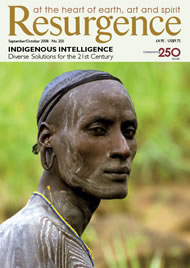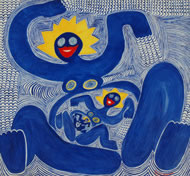MANY SPIRITUAL WRITERS have observed, “When you meet another person, you are encountering something in yourself.” It’s easy to say a simple, subtle thing like that and pass it by. But maybe this ancient idea is more important and has more wisdom than we think.
Daily life is much like being in a dream. You meet an older man, and your interaction borrows something from your father. You smell fresh-cut grass, and you’re brought back to a charming day in your childhood. You feel a chill crossing a high bridge, and you know that some unknown symbolic fear is working in you.
The people we run into every day are figures of the imagination, as well as real people. All of them. At the beginning of his memoirs, C. G. Jung said, “Other people are established inalienably in my memories only if their names were entered in the scrolls of my destiny from the beginning, so that encountering them was at the same time a kind of recollection.” You meet someone, and a slice of memory or dream is plucked into action.
We like some people because they mirror a figure in our soul we appreciate and approve. Others we fear or dislike because they reflect something we know deep inside us that is bother-some or objectionable. Personally, I have trouble with and am prejudiced against jocks: sports types who are full of themselves and socially insensitive. A jock is in me somewhere, and I’d like to have some of his bold spirit, but he eludes me. I feel uneasy, too, around certain wealthy types: I was a monk with a vow of poverty at one time, and the monk’s life had roots in my family’s ambivalence about money.
The roots of intolerance run deep. We speak of cultural diversity and ethnic prejudice, whereas the real issue is the diversity of the human soul. We can be many things in a lifetime, but often we choose to enact a very small portion of our possibilities. We’re afraid of the range of who we can be and take comfort in the status quo. In Freud’s language, we choose the death principle, repeating the same person we have always been, rather than risk the adventure of new discoveries of self.
But life everywhere is diverse. Go snorkelling in Mexico, and you will be astonished at the impossible shapes and colours of sea-life all around you. Look long into the night sky and behold the vast diversity of the universe. The great heretic theologian Origen once said that we all have within us a sun, a moon and stars. We also have within us the African, the Eskimo, the Asian and the European. Cultural diversity is part of life’s diversity.
Why is it that some people luxuriate in differences among cultures and peoples, while others become disturbed and violent? Mainly because some of us have not learned to appreciate our own personal diversity. We are afraid to let life happen, afraid to allow a crack to appear in the monochromatic world that keeps us defensively safe, or at least gives us the illusion of safety.
Consider the various ways sexuality presents itself. Promiscuity, homosexuality, adultery, divorce, nudity and even erotic art send some people up against the border of their comfort zone. Many would rather have their spirits crushed by suppressing their sexual desire than appreciate the possibilities. Sex is a potent presentation of life’s vitality, and the way we deal with sex often reveals how open we are to life.
Diversity of skin colour, language, customs, food, religion and lifestyle presents a similar threat to anyone who has sold their soul to the familiar and acceptable. Like the many forms of sexuality, these cultural qualities all represent life’s vitality. Some people glimpse the powerful rush of life in cultural diversity, and protect themselves by violently trying to suppress it. The alternative, and maybe the solution to cultural conflict, is to have a big heart and let life display itself in all its variety.
Cultural diversity need not be just race diversity or nationality and tribal diversity. I sometimes advise my clients in therapy to travel to the other side of town and see how people live. Open your eyes and heart to embrace the diversity of your neighbours. Make a journey around your family and run up against the limits of your tolerance and the doorway to new vitality for yourself. Travel in your house and discover the exotic life your spouse and children enjoy. Finally, as I have been saying, you can take a voyage around in your soul and glimpse many of the selves you’re capable of becoming and some you might better avoid. Your own diversity is a gateway to a richer life in the world.
Cultural diversity is as vast as the night sky and as intimate as a moment of meditation in which you notice the sun and moon and stars in your heart. It is everything in between as well: the love of a foreign language, the savouring of a foreign dish, the delight at an odd belief and custom. In an essay on marriage, Jung once said that the biggest mistake people make is to assume that the partner has the same make-up as they have. We could say the same about all the neighbours and partners in the world: our biggest mistake is to think that they are or should be like us. And that mistake is rooted in a deeper, more personal mistake: the idea that the person we have always been should always be unchanged, comfortable and colourless.
It is a healing thing to embrace life’s infinite variety. Cultural diversity works both ways: enjoy your own complexity and contradictions, and you may appreciate differences among the people of the world. Learn how to be open to cultural differences, and you will be a more complex, colourful and interesting person.








